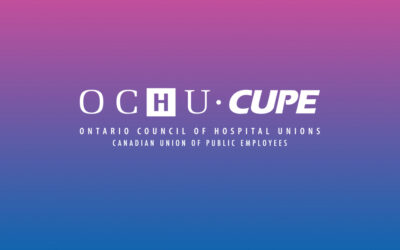CUPE Paramedical Professionals at Campbellford Hospital would enjoy superior working conditions
You Deserve Better – You Deserve CUPE
Attend the Paramedical Professional Meeting on January 7, 2025, 2:00 – 6:00pm at Capers 28 Bridge Street West Campbellford – private dining room upstairs
YOUR PARAMEDICAL PROFESSIONAL CO-WORKERS ARE ORGANIZING A UNION! When you are organized with CUPE you have:
- More power to win annual wage increases, benefits, job security, and seniority rights.
- The strongest job security protection of any health care union in Ontario.
- Fair and transparent policies on promotions, job assignments, and the hiring process.
- Involvement in decision-making processes that affect your working conditions.
- The ability to negotiate protection against excessive workloads and other changes to reduce stress in the workplace.
- A platform for equal representation that contributes to a workplace culture built on respect and fairness.
CUPE represents the majority of hospital workers in Ontario, with over 40,000 members represented by the Ontario Council of Hospital Unions. There are many advantages to being a member of CUPE, a strong, democratic union. One of the biggest is never having to face your employer alone. A union is YOU and your CO-WORKERS coming together to improve your working conditions. Together you will have the ability to decide what aspects of your job need to change for the better. Without a union contract, the employer can change the terms and conditions of your employment by themselves at any time.
CUPE is the union for hospital workers: CUPE is leading campaigns for higher wages, job security, and real solutions to the staffing crisis to guarantee timely, high-quality publicly funded and publicly delivered healthcare in Ontario hospitals. CUPE hospital workers have negotiated:
- Wage increases of 14.25% for the period 2021-24 (4.75% in 2021, 3.5% in 2022, 3% in each of 2023 and 2024).
- Increases of $1-$1.87/hour for evening/night and weekend premiums, significantly improved benefits, among many other gains.
- Negotiated 8.25% wage increases for 2021 and 2022, along with increases of $1-$1.50/hour for evening/night and weekend premiums
- The best job security protections of any healthcare union in Ontario
- Clear and transparent seniority-based posting and hiring processes that prevent management favouritism and discrimination
- A bargaining council – the Ontario Council of Hospital Unions – to fight for better contracts and better conditions for all workers and students in Ontario hospitals
CUPE is Canada’s largest union with 740,000 members. We are also Canada’s largest healthcare union with over 80,000 members in Ontario’s hospitals, long-term care facilities, home care, and emergency services. At CUPE, the members are in charge, electing your own leaders and setting priorities for negotiations. Members decide priorities – and are supported by legal, research, organizing, and communications resources. And if you have to fight, you’ll have all CUPE members standing with you and can access the incredible resources of the union. Case Study: When workers at Toronto General organized with CUPE they negotiated a contract that included wage increases, seniority rights, protection from layoffs, and other improvements.
1. How can unionizing help protect my job? As a non-union employee your only protection in case of job loss is the Employment Standards Act (ESA), the bare minimum in Ontario. As a unionized employee you will have the right to negotiate a collective agreement with much stronger protections than the legislative minimum. CUPE collective agreements have the strongest job security protections in the hospital sector in Ontario. Under CUPE hospital collective agreements, the Hospital must meet with the union first to exhaust all possible alternatives to a layoff. If a layoff cannot be avoided, the hospital must follow a series of steps, some of which can be costly to the Hospital, before they can lay an employee off.
2. If we unionize with CUPE will we have a single collective agreement with the service workers? Or a separate paramedical professional agreement? As a new group of unionized workers, the default will be for you to have a separate collective agreement from the existing CUPE members at Campbellford Hospital. To have a single joint collective agreement covering paramedical professionals and other staff, paramedical professionals would have to vote to say they want a single joint collective agreement, the other employees would also have vote in favour, and the employer would also have to agree. Regardless, CUPE hospital collective agreements are extremely standardized and many of the terms and provisions of these two collective agreements will be identical.
3. How do you know that hospital workers at Campbellford Hospital would get the same general wage increase as other hospital workers when we win the union? The hospital sector in Ontario is highly standardized. CUPE represents the overwhelming majority of hospital paramedical professionals, and we set the pattern for collective agreements covering paramedical professionals.
4. What would happen to my pension if I join CUPE? Campbellford Hospital workers are in the same Healthcare of Ontario Pension Plan (HOOPP) as other hospital workers in the province so you will continue to have your HOOPP pension plan. You will be stronger united with CUPE hospital workers across the province to defend your pension plan when it is threatened with cuts, and you will have CUPE representation on the HOOPP Board of Trustees.
5. What would happen to my benefits if I join CUPE? CUPE hospital workers have comprehensive benefit coverage that varies by hospital. One of the most important benefits is that when you are unionized you have the power to negotiate improvements to the benefits plan and oppose cuts to benefits or increases to premiums. If you have questions about benefits, contact an organizer at cupeontarioorganizer@cupe.ca
6. What about vacation pay? How would that change when we are unionized? Vacation entitlements will be the subject of negotiations when you and your co-workers negotiate your first collective agreement. With a union you and your coworkers can make vacation improvements a priority and fight for improvements through the negotiations process. Without a union the employer can change your entitlements as long as they comply the Employment Standards Act minimums.
7. I’m worried about the employer finding out I signed a union card, I can’t afford to lose my job. At no point in the campaign does the employer see a list of which workers have signed cards. It is illegal in Ontario for an employer to intimidate or interfere with workers organizing a union. Section 72 of the Ontario Labour Relations Act also precludes any person acting on behalf of the employer from threatening any kind of penalty for joining a union. If a management representative or someone acting on behalf of the employer approaches you or one of your coworkers and threatens or intimidates you, please let us know. Contact sharonricher@ochu.on.ca
8. I had to take paid sick days to deal with a serious health issue and didn’t feel supported when I returned to work. When you are unionized you have representation and support around sick leave and accommodation in the workplace. When you have a union contract there is a process and representation to be able to file a grievance if a leave or accommodation is denied.
9. What are union dues and how much do I have to pay? Union dues are the resources that workers pool together to fight for strong collective agreements, union representation and more. In CUPE locals set their own dues rate. CUPE members vote to decide how much their local will collect above the 0.85% minimum which funds staff resources for the union and more. The breakdown of all local expenses is shared with the members through regular financial reports.
10. What is a collective agreement? A collective agreement is a legally binding contract negotiated between an employer and a labour union. A collective agreement outlines the terms and conditions of employment for the covered workers. These terms and conditions are agreed upon by the employer and union through negotiations. A collective agreement provides details on your rights and protections at work. The key components of this agreement will include details on Wages and other compensation, hours of work, seniority rights, job protection, grievance and arbitration process, etc.
11. Why aren’t we unionized yet? To win a union, you and your coworkers need to sign up and vote. PLEASE CONTACT sharonricher@ochu.on.ca TO GET A UNION CARD. That’s an important first step! The next step is for you to speak with your coworkers about the value of unionizing. Don’t be discouraged if they repeat some of the classic employer myths about unionizing—check out these responses here. Paramedical professionals played an integral role during the Pandemic but did not receive sufficient recognition or compensation. It’s time for paramedical professionals at Campbellford Hospital to join together to protect your jobs and negotiate for the improvements you deserve!
Paramedical professionals at Campbellford Hospital are signing cards to build the collective power to win wage increases, job security, fair job posting and hiring processes, just-cause protection, health and safety protection, and a stronger voice at work to address concerns around workload and staffing. It is common for employers try to discourage workers from forming a union by spreading misinformation. Here are some of the most common myths about unionization:
MYTH: “‘The union’ will come between you and management, and hurt our positive relationship” OR “‘The union’ will make changes to your job in ways you don’t want, and you won’t have a say; you will lose your ability to negotiate one-on-one”
TRUTH: In CUPE, there is no “union” separate and apart from you and your co-workers. With a Union you and your coworkers are united and stronger together, because united you have more power to win the changes that YOU decide YOU want to win together. How well does one-on-one negotiations between a worker and their employer work anyway? Not usually very well, especially on the big issues.
MYTH: “You will pay dues and lose more than you gain”
TRUTH: Dues are the resources that workers pool together to build strong campaigns and contracts that win improvements to wages, staffing, benefits and working conditions. Hospital workers have won 14.25% in wage increases from 2021-24, huge increases to shift and weekend premiums, and many other improvements. Dues were the resources they used in their campaign when the hospitals refused to negotiate real wage increases.
MYTH: “The union can’t promise anything”
TRUTH: This just isn’t true. While terms of the local contract must be negotiated, joining CUPE means having strong representation if/when you need it, not having to face management alone, a collective voice at work and the power to win improvements to your job. Joining a union means you can raise issues without fear of reprisal and have a set of rules that your employer must follow. Right now, for non-union employees, the employer gets to set the rules regardless of how they might affect the workers, and they can apply them unfairly or change them whenever they want. When you join a union you have “just cause” protection meaning you can’t be disciplined or terminated without a really good reason.
MYTH: “Unionizing will result in wage reductions or layoffs”
TRUTH: Wages don’t go down when workers organize a union (in fact the ability to negotiate fair wage increases is a common reason that workers organize a union). Unionized hospital workers have powerful job security protections that non-union hospital workers do not enjoy. Without a union at Campbellford Hospital, the employer can unilaterally change duties and job descriptions at any time.
MYTH: “Unions force workers to go out on strike”
TRUTH: Workers never go out on strike without a vote – it’s a collective decision to use union power to win. In the hospital sector, the right to strike is replaced by binding arbitration.
Organizers are here to support you through the process of forming your union! If you would like to set up a meeting with a CUPE organizer as an individual or as a group, please reach out to:
Sharon Richer
Secretary-Treasurer for OCHU-CUPE
sharonricher@ochu.on.ca
705-280-0911

CUPE has provided an e-card so that you can sign online.
Complete the contact form here. You will be brought to an e-card which will ask you to fill out contact information and a signature. Once you complete the signature you will receive a request to the email provided from Adobe Sign asking you to confirm your signature. When you have done this final step, you will receive a confirmation email.
At no point in the campaign does the employer see a list of which workers have signed cards.
Join with unionized workers in fighting for the best wages and working conditions in the sector!
News
53% of Peterborough/Lindsay hospital nurses, PSWs other staff report feeling depressed, emotionally exhausted as pandemic violence surges; new CUPE poll finds
PETERBOROUGH, ON – At both Peterborough Regional Health Centre (PRHC) and Ross Memorial Hospital, registered practical nurses (RPNs), personal...
55% of Lakeridge hospital nurses, PSWs other staff physically assaulted at work as pandemic violence surges; new CUPE poll finds
OSHAWA, ON –Lakeridge Health Centre registered practical nurses (RPNs), personal support workers (PSWs), cleaners, porters and clerical staff polled...
67% of Huron Perth hospital nurses, PSWs other staff physically assaulted at work as pandemic violence surges; new CUPE poll finds
STRATFORD, ON – Huron Perth Health Alliance (HPHA)registered practical nurses (RPNs), personal support workers (PSWs), cleaners, porters and...




